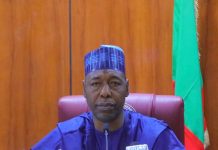Taxation is as old as modern civilization. In fact, it has often been described as the mark of civilization.
The evolution of taxation has been traced by scholars to ancient Egypt (Pre-3000 BC to 300BC), where the Egyptian ruler, Pharaoh, instructed his chief minister, known then as the vizier, to organize thousands of scribes to collect taxes from all citizens of the kingdom. It was the responsibility of citizens to declare their livelihood, for which failure to comply was punishable by flogging or death.
Tax payment thereafter evolved to China, Greece, India, the Inca Empire, the Roman Empire and down to the United Kingdom in 410 AD to 1816 AD, where modifications and modernization of the tax processes continued to evolve.
Even the holy book of Christians, at Matthew 17:24-27 showed clearly that paying tax is a Christian obligation to the government! Jesus Christ paid his tax as recorded in the above gospel passage: “So that we may not offend them, go to the lake and throw out your line, take the first fish you catch; open its mouth and you will find four drachma coin. Take it and give it to them for my tax and yours” (NIV).
For most Nigerians, the idea of having to pay any form of tax can be a very ‘unpleasant’ experience. Yes, some would argue that paying tax is not in our ‘gene’ as Nigerians. Yet we expect to get every good service free from our government without any responsible reciprocal actions on our part. This probably explains why most of us leave our bulbs turned on, even in the day time when we do not need it.
This ‘entitlement’ mentality also clogs our appreciation of the fact that government can give us the quality of service we desire, only if we become active participants in the governance process by playing our roles as responsible citizens by paying our taxes. It is when we pay our taxes that we can have a loud enough voice to constructively engage government to our benefit, both as individuals, corporate entities, and the community as a whole.
Truth be told, taxes remain the most sustainable and reliable sources of public revenue of any modern government. Now, the laws of the land recognize the importance of having government activities run as smoothly as possible, and have made paying of taxes a compulsory civic duty which all citizens who earn a living are obligated to do as part of their contribution to supporting the funding of government expenditure. This role makes us part of the governance process.
We the people can demand specific services from our elected leaders if we contribute, though in different categories, to the survival of the system. For, in the absence of government, this system of representative leadership, the only other alternative is chaos and a total breakdown of society and its institutions.
However, to fully appreciate the tax environment in Nigeria, and why “tax morale” is very low, one would need to hear from experts in the field who have carried out a number of studies to find out why most Nigerians shirk this all-important responsibility of paying tax.
A 2018 survey by the Nigerian Economic Summit Group, NESG, titled, “Tax Perception Survey” sought to enquire into why most economically active citizen do not pay tax. The outcome of the survey was quite revealing and instructive.
It turned out that most potential tax payers attributed their attitude to dissatisfaction with the tax administration process with regards to lack of trust of tax officials and government as a whole; little or no awareness of “what government does for the people” in terms of ‘evidence’ of what it does with tax revenue; complexity of the tax process as well as poor enforcement of tax laws.
The survey also showed that most potential tax payers were willing to comply, when government is able to guarantee social services like quality education, quality health care and provision of good roads and other infrastructure that make life more meaningful. These legitimate concerns of Nigerians, if addressed adequately, could provide the much-needed positive change in the trajectory of tax revenues in the country.
Also, in an article titled, “Tax Revenue Mobilization in Nigeria”, the duo of Messrs Adenyi Adeyemi and Adedapo Adeduro wrote: “According to recent estimates from the International Centre of Tax and Development, the tax revenues account for more than 80 percent of total revenue in about half of the countries of the world, and more than 50 percent in almost every country.
The article went further to state that ‘The statistics on tax payment by economically active persons in Nigeria are equally disturbing. The Nigerian Bureau of Statistics, NBS, puts Nigeria population of employed persons at 65.5 million people as at September 2018. However, the individual tax paying population is estimated at 19 million, indicating that about 50.5 million employed Nigerians operate outside the tax net’. It concludes by saying that “Evidently, the level of tax compliance is dismal, and this accounts for the low rate of tax revenue to the country’s gross domestic product (GDP)”.
Available data show that non-oil revenue in Nigeria hovers around 3 to 4 per cent of the GDP, for below countries like South Africa and Brazil where non-oil revenues are between 20 and 25 percent of their Gross Domestic Product.
Against this backdrop, there is urgent need for governments to restructure revenue generation templates in order to move away from the over dependence on an oil economy which has proven over time to be undependable and unsustainable.
The collapse of world oil prices, the 2015 economic recession in Nigeria, now recently compounded by the economic downturn occasioned by the corona virus disease (COVID-19) creates a compelling need for governments at all levels to redefine their approach to taxation by taking a critical look at the issues thrown up by the NESG Survey earlier referred to and put appropriate strategies in place to address them.
Tax education activities must become a key strategy in enlightening the tax paying public about the processes of tax assessment and payment. People need to know on a regular basis what government does with tax revenue in such a way that the citizens are confident of the integrity of government in tax administration and utilization of tax revenue.
According to the Nigeria’s Governors Forum’s “Tax-for-service” initiative, “The poor social contract between governments and citizens has left tax payers reluctant to voluntarily comply with tax obligations”
There is also the need to demystify the tax process to enable an environment in which citizens can access information on the tax process and their role in it. Government can actually do more to mainstream the intersection of public financial management and public service delivery.
It is no longer news that the Nigerian economy is passing through multiple strains imposed by the near collapse of the world oil market, the 2015 recession, COVID-19 and recently the #EndSARS demonstrations which snowballed into an orgy of violence and destruction on an already fragile economy.
Therefore, there is a need by government to evolve strategies to beef up internally generated revenue (IGR), especially in view of the very possible threat to government’s ability to deliver on its mandate. Going by this realization then, governments at all levels must consider restructuring their internal revenue generation administration to give them the required autonomy that will enhance their ability to deliver their mandate in line with global best practices.
Emephia, the Public Relations Officer of the Delta State Internal Revenue Service, writes from Warri.

















